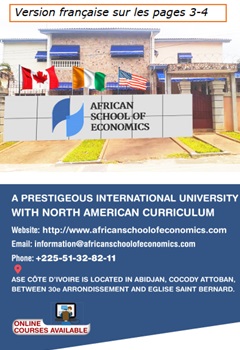Due to the many unknowns about the magnitude of the COVID-19 crisis, Professor Léonard Wantchékon and the African School of Economics are offering a series of exchanges of information and analysis through the “Questions to the Experts” column.
It is a Q&A with health and science specialists, including epidemiologists, virologists, biostatisticians, and public health researchers. They will be responsible for enlightening the ASE community and, in turn, populations still plagued by misinformation about this pandemic. Professor Wantchekon gave the following introductory remarks:
Fellow citizens,
In this time of uncertainty and hardship, as President of ASE, I would like to provide you with a series of information and analysis on the current health crisis, as well as its medical consequences and economic and social economic spinoffs.
As you know, the COVID-19 pandemic shaking the world has claimed the lives of more than a million. The World Health Organization (WHO) Africa regional office forecasts that 83,000 to 190,000 people may die from COVID-19 in Africa in the first year of the pandemic. Although, fortunately, these predictions are far from being reached, the continent has already recorded 3,462 deaths out of 142,897 cumulative confirmed cases as of June 10.
As at present, the least we can say is that everyone is affected by the current crisis. The exploratory study carried out by the African School of Economics on this pandemic reveals that 98% of the respondents closely follow information on COVID-19 in Benin, more specifically within the sanitary cordon in the south of the country. However, the levels of awareness, and especially the channels of information on the manifestations of the disease are diverse. Of these 98%, respectively 72%, 66%, and 60% received information on television, on social networks (WhatsApp, Facebook, etc.), and on radio. However, only 9% of respondents learned about it through awareness campaigns versus 43% through word of mouth.
Also, only 34% of respondents have proven knowledge on how coronavirus is spread from one individual to another. This means that most of the information received by the population is neither verified nor validated by public health or epidemiology experts in our country.
Worse still, conspiracy theories are fabricated and spread on social media. Some say that the WHO has purposely chosen to exaggerate the extent of the crisis, and that the cures discovered by Africans, especially the Malagasy people, are rejected by the international scientific community because of a colonial-style superiority complex. Others give themselves up to disinformation and openly ask to reject the very idea of the vaccine, or to choose instead to strengthen their immune system by sleeping 8 to 10 hours a day!
This situation has caused a lot of confusion and anxiety among the populations. More than ever, it is urgent to conduct in-depth investigations on the current situation, and to allow scientific research to educate us on the pandemic and to guide health policies. In other words, question the Beninese and African experts and ask them a few direct and simple questions about COVID-19 and its impact. Why are Africa and developing countries relatively spared from the COVID-19 crisis? Should we believe in the cures promoted here and there including the COVID-Organics of the Malagasy President? If yes, why? What are the economic and social implications of the pandemic? How can it be cured?
The African School of Economics, for this reason, will provide you with periodic “Questions to Experts.” It is a series of questions and answers with specialists in the health sciences. There will also be interventions by researchers in social science, including economists, sociologists and anthropologists, to discuss socio-economic impacts and prospects.
The first edition of “Questions to Experts” went live on May 22nd, with Dr. Thierry Adoukonou, director of the school of epidemiology in the faculty of medicine at Parakou University.


